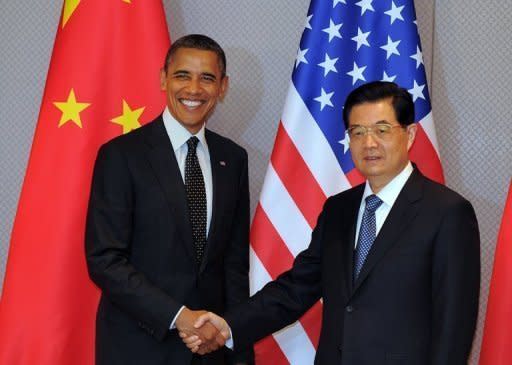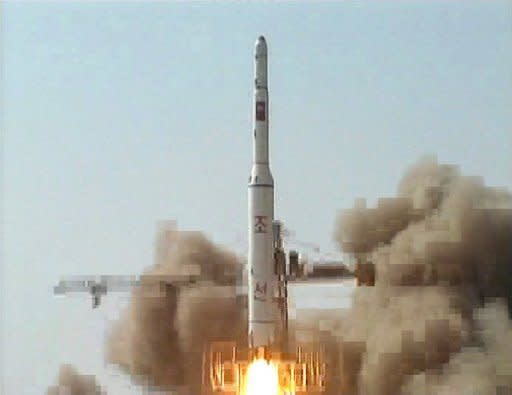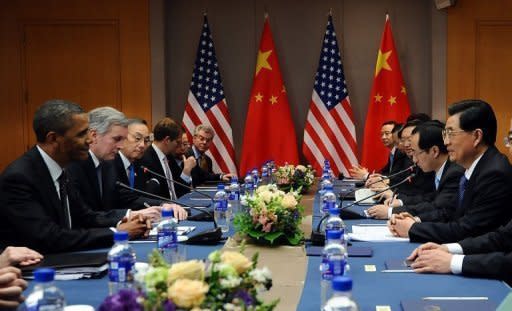US says China has 'serious concern' at N. Korea launch
China has expressed "serious concern" to its ally North Korea about a planned rocket launch, a US official said Monday after talks between President Barack Obama and President Hu Jintao. The leaders met a day after Obama made an unusually blunt appeal to Beijing to get tougher with Pyongyang. Numerous nations have strongly criticised the launch set for mid-April. The nuclear-armed North insists it will only put a satellite into orbit, while its opponents say it will test missile technology that could deliver a warhead. China, the North's sole major ally and its biggest trade partner and aid provider, is seen as one of the few nations that can influence the regime. "The two leaders agreed to coordinate closely in responding to this potential provocation and registering our serious concern to the North Koreans and, if necessary, consider what steps need to be taken following a potential satellite launch," said Ben Rhodes, a deputy national security adviser. Given China's influence, Obama "felt it was very important for us to be working closely with China and for China to be sending a very strong message to North Korea", Rhodes said. The Chinese "have indicated to us that they take this very seriously, that theyâve registered their concerns with the North Koreans," he told reporters. Beijing would work actively with Washington and other six-party talks members "to make clear to the North Koreans the very grave concerns that the international community has if they go forward with this provocative act". The now-stalled six-party forum, grouping the two Koreas, Russia, China, the US and Japan, has been trying since 2003 to negotiate an end to the North's atomic weapons programme. Obama and Hu met before the start of a nuclear terrorism summit in South Korea which has been overshadowed by the launch and by Iran's suspected attempts to develop nuclear weapons. Obama made it clear Sunday that he did not believe China's approach to its wayward neighbour was bearing fruit. It was not working for China to turn "a blind eye to deliberate provocations, trying to paper over these not just provocative words but extraordinarily provocative acts that violate international norms", he said. The US and many other nations say a launch would breach UN resolutions. Washington says it also violates a US-North Korean deal reached only last month, which offered US food aid in return for a partial nuclear freeze and a missile test moratorium. On Iran, Rhodes said Obama and Hu welcomed upcoming diplomatic efforts by the P5 plus One group to end the nuclear standoff. "We of course underscored that we need to move forward with a sense of urgency in these talks," he said. The five permanent members of the UN Security Council plus Germany are trying to broker a solution but Obama warned earlier Monday that "time is short". On Sudan, the US and Chinese leaders agreed to stay coordinated "and send a clear message to both sides they need to make efforts to cease violence", Rhodes said. Obama and Hu, holding their 11th meeting, were attempting to keep ties stable despite domestic political turbulence in both nations. A new generation of leaders is poised to assume power in China and Obama is fighting for re-election. Obama must watch his flank as his likely Republican foe Mitt Romney lacerates his policy towards Beijing, seeking to exploit a perception among blue-collar voters that unfair Chinese trade practices are costing US jobs. Hu entered the Obama meeting against a backdrop of intrigue ahead of the 18th Communist Party Congress later this year, expected to enshrine Xi Jinping as China's next leader. Their meeting came after China's Communist Party leadership was rocked by a rare scandal. Bo Xilai, leader of the Chongqing metropolis, was sacked after a key aide reportedly tried to defect to the United States. "I think the summit meeting is very important for both countries, especially on the domestic side, given the election year in the US and the political earthquake surrounding the removal of Bo Xilai," said Zhu Feng, professor of international relations at Peking University. "There needs to be an exchange of views on how bilateral relations can stay the same without too many disruptions over election politics and domestic factors," he said.





